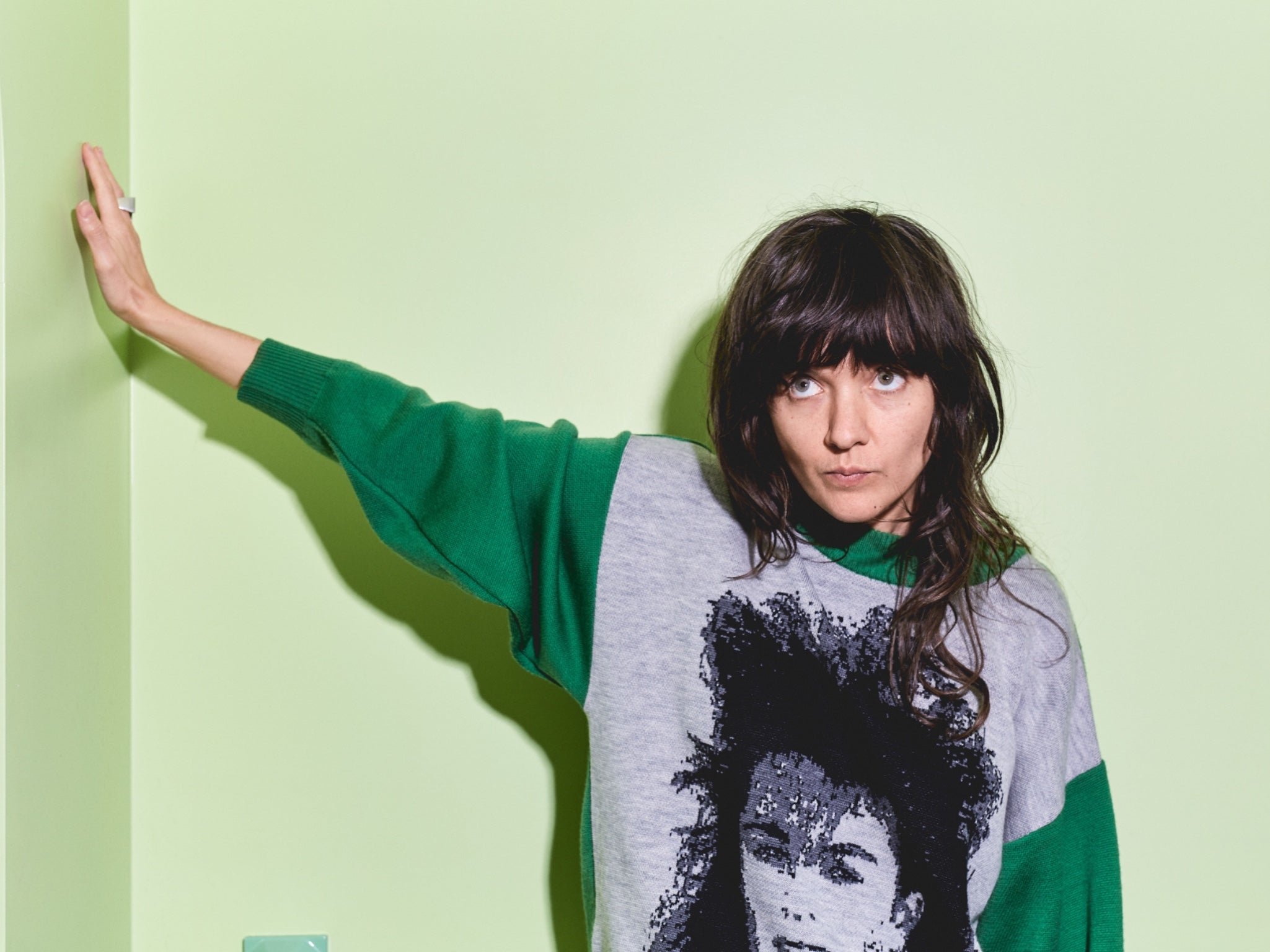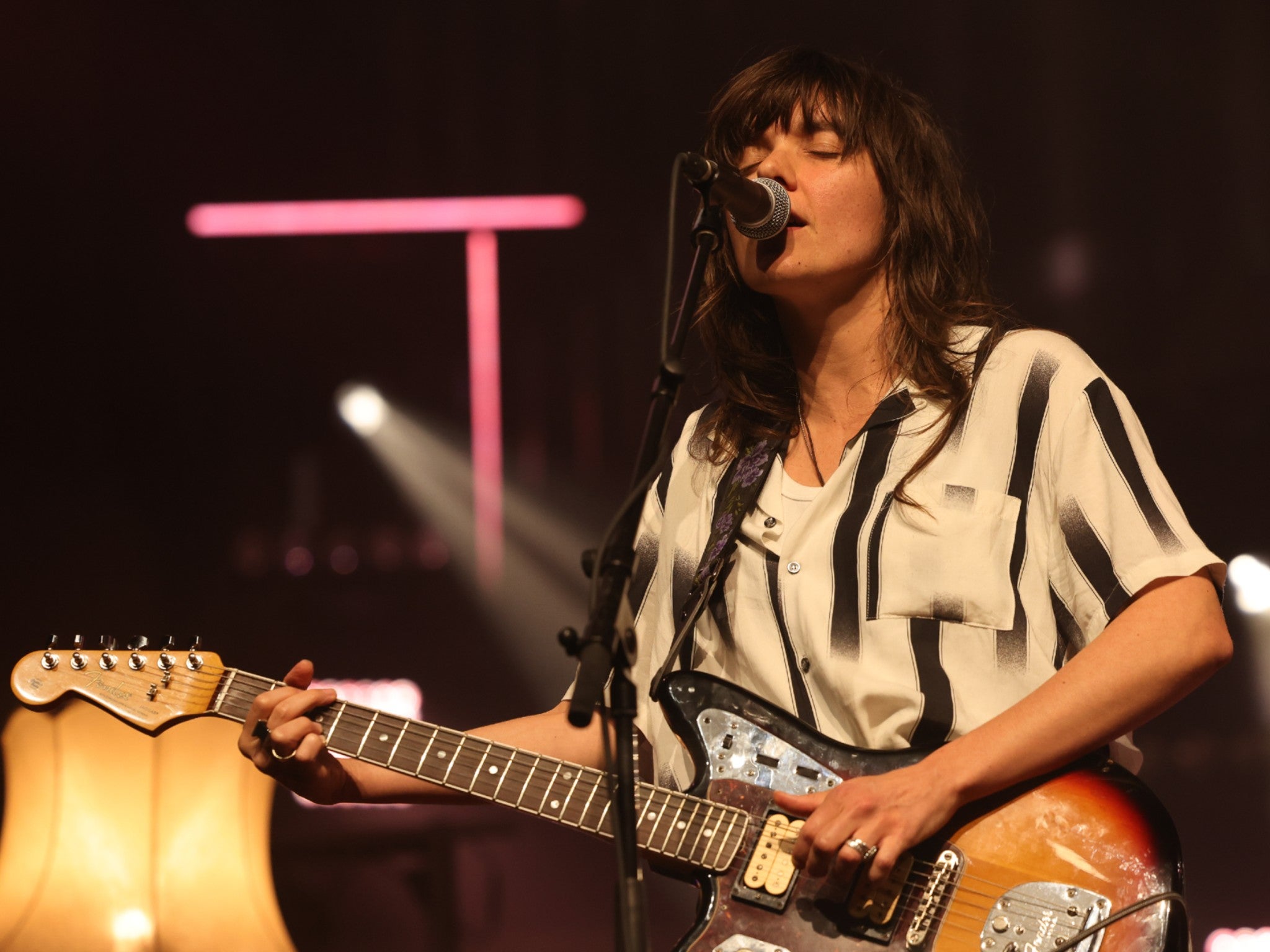Courtney Barnett: ‘I often feel I’m not smart enough to be part of the conversation’
The Australian alt-rock star was facing burnout, a break-up and the fallout from the bushfires and LGBTQ+ marriage vote when the pandemic hit, but a period of intense reflection has resulted in her most personal album yet. She talks to Elizabeth Aubrey about growth, confidence and confronting yourself

Your support helps us to tell the story
From reproductive rights to climate change to Big Tech, The Independent is on the ground when the story is developing. Whether it's investigating the financials of Elon Musk's pro-Trump PAC or producing our latest documentary, 'The A Word', which shines a light on the American women fighting for reproductive rights, we know how important it is to parse out the facts from the messaging.
At such a critical moment in US history, we need reporters on the ground. Your donation allows us to keep sending journalists to speak to both sides of the story.
The Independent is trusted by Americans across the entire political spectrum. And unlike many other quality news outlets, we choose not to lock Americans out of our reporting and analysis with paywalls. We believe quality journalism should be available to everyone, paid for by those who can afford it.
Your support makes all the difference.Lush greenery bursts onto the screen as Courtney Barnett starts the video call. Her phone’s camera is pointing outwards towards rolling hills; birds squawk loudly in the background. The Australian musician is calling not from her Melbourne home but the idyllic Piha Beach near Auckland, New Zealand, where she’s nearing the end of a three-week tour. It’s her first live outing in more than 18 months and it’s clear she couldn’t be happier to be back onstage, playing new songs and seeing new places. “Hang on, I’ll show you the trees,” she says, like an excitable tourist, panning the camera phone to reveal a forest that’s leapt straight out of the pages of Lord of the Rings. “It’s beautiful here,” she says, sounding content, her smiling face now in view.
Like it has for many people during the past year, it’s been a period of intense reflection for Barnett that turned into a welcome pause, which has resulted in her new and third album, Things Take Time, Take Time. And Barnett, for once, has really needed to. Since she burst onto Melbourne’s DIY indie circuit circa 2012, reinventing grunge, indie and alt-rock for the 21st century through a female, queer, feminist lens, it’s been go go go. Mixing sardonic, rambling lyrics with a deadpan delivery, her songs are full of contemporary ennui, taking the everyday and turning it into screams of existential dread. Not for nothing was her debut album, 2016’s Sometimes I Sit and Think, and Sometimes I Just Sit, nominated for a Grammy and a Brit Award. Its follow-up, 2018’s Tell Me How You Really Feel, was just as good, picking at the scabs of her anxieties as she grappled with her increasing fame as a global indie superstar.
“It was crazy,” Barnett recalls of the period around her second record. A hectic touring schedule, a break-up with long-term partner Jen Cloher and disillusionment at Australia’s politics all took a significant toll. The country’s decision to vote on gay marriage in November 2017 was a particular low point. “It was so hurtful to so many people and so many families that already existed,” she explains, still clearly upset by the pain in caused Australia’s LGBTQ+ community and her own identity as a gay woman caught up in the middle of it all. “Their validity was being questioned, it was being put up for a vote and it was just incredibly damaging.”
While the vote was passed, it didn’t stop Barnett seeing the fall-out from those who voted against it first-hand when she covered INXS’s “Never Tear Us Apart” for an Apple advertisement in February 2018. What was meant to be a celebration of same-sex marriage turned into a backlash: the video was deluged with homophobic comments online. “I wasn’t shocked by it,” Barnett sighs, adding that it reflected the toxic public dialogue surrounding the vote. “I would normally pass on an advert like that, but I just thought it was for a good cause. To be able to send a positive message was something I thought worthwhile and because of course it was so topical. Instead, it was all just all so negative.”
A long period of touring followed; next came Australia’s devastating bushfires in late 2019. Barnett played two benefit concerts in the early part of 2020 to help support those affected but grew dismayed at the government’s inadequate response as people’s homes and workplaces burned. “It was just desperately sad,” she sighs. “It was also definitely a feeling of just severe frustration. Everyone else was pitching in to do the work that the government wasn’t doing.”
A further tour in LA happened in late January 2020. Barnett was already close to burnout – but not because of playing, she clarifies, but because she was tired of life. She returned to Australia during the early days of the pandemic and after a stint in quarantine, became overwhelmed with “pain and sadness”. It takes Barnett a while to open up. Famously shy, she tightens like a clam when she catches herself giving too much away or sensing that a more personal question is afoot. She slowly explains that a personal and creative rethink was needed: all the songs she’d written for album three up to this point went in the bin – bar one, “Write a List of Things to Look Forward To”.
One of Barnett’s friends was worried about her state in early 2020 and staged an intervention, asking her to write a list of things she was excited about in the future, in an attempt to renew Barnett’s hope. At first, the list remained empty for weeks. Barnett moved apartments, living alone for the first time in her life, and learned to cook, watched movies, and started to paint. Slowly, the list started to fill.
“I was trying to find the positives in a negative situation,” Barnett says of the track, which eventually became the first one to be finished on Things Take Time, Take Time. It’s a sunny road-trip of a song with breezy guitars reminiscent of Wilco’s “Summer Teeth”. “And so, on it goes / I’m looking forward to the next letter that I’m gonna get from you,” Barnett sings, sounding renewed.

“I think everything in life is about balance, not just for me but for everyone. Work, family, life, trouble,” Barnett laughs. Once she found it, the songs started to arrive once more – as did hope. “Finding that balance again was important,” she continues. “I was so lucky because I came back from LA to Melbourne and I was in between houses. I didn’t know where I was going to stay and my friends let me take over their lease. I was so grateful that I got this flat to live in, and the song is similar to a gratitude list of sorts. It’s assessing where you’re at in life, what you have and how lucky you are to have it.”
Enjoy unlimited access to 100 million ad-free songs and podcasts with Amazon Music
Sign up now for a 4 month free trial (3 months for non-Prime members)
Enjoy unlimited access to 100 million ad-free songs and podcasts with Amazon Music
Sign up now for a 4 month free trial (3 months for non-Prime members)
The song, like much of Things Take Time…, feels like a DIY affair in places, reflecting the peace and simplicity Barnett found in lockdown, writing songs alone on her acoustic guitar. Once she’d got the bare bones down, she and Warpaint’s Stella Mozgawa – with whom she’d worked previously on a covers album with Kurt Vile – headed to Sydney’s Golden Retriever Studios to lay down the tracks together. They played all the instruments themselves, including a vintage drum machine that Barnett had picked up from Wilco’s The Loft studio two years ago. Its beats drive the standout track “Turning Green”, where Barnett recalls the hope she found watching the seasons change in her new apartment. “The trees are turning green / And this springtime lethargy / Is kinda forcing you to see / Flowers in the weeds,” she reflects in the refrain. “It’s seeing the beautiful things among the mess and finding a way [forward],” Barnett says of the song now – but it feels like the album’s manifesto, too.
Her humorous observational style is back at its best on lead single “Rae Street”, meanwhile, as she sings: “All out candles, hopes and prayers / Though well meanin’ they don’t mean a thing / Unless we see some change / I might change my sheets today.” Barnett laughs recalling the lyric. “Sometimes I think things can be more powerful when they’re subtle,” she says, slowly taking a sip from her mug of coffee and pulling her trademark beanie hat down over her bed-head hair. “Small actions count just as much as big ones, small changes eventually bring big ones.” She elaborates further. “I think things are changing for the better, but it’s gradual. I always get worried that people just learn to say the right thing.”
It was a series of slow, small changes, Barnett says, that led her to make the big changes that came in her life over the last year while recording Things Take Time…. One was accepting that she needed to renew relationships with friends and family. Several songs on the new album are odes to friendships, like the airy “Sunfair Sundown”. She connected with her friends and family over Zoom more too, attempting to find a “deeper connection” with them all where possible. She also realised that Things Take Time… had become the most vulnerable album she’d written: it even contains her first ever love song, “Before You Gotta Go”, which gently twinkles into life and then captures the rush of the first stages of a new relationship.

“This extra level of self-reflections and depth [during lockdown] gave me an unobstructed view of myself that maybe before, in other circumstances, I could just avoid by distracting myself with people or activities or going out somewhere,” she says. “There was none of that. This was a forced, more direct look into myself. Certain levels of that were probably very confronting but I tried to make the most of the parameters set for me.”
Despite Barnett’s success, self-confidence issues have always followed her around. Early song “Pedestrian at Best” hears her sing:“Put me on a pedestal and I’ll only disappoint you.” There are hints of it when we chat, as she recalls nervously trying out songs for the first time, or re-words her answers tentatively. Barnett says she’s not sure where her confidence issues come from. “I’ve tried to trace it back, [to see] if there was a moment where I was embarrassed in my youth or something, but I think I was just always scared of public speaking. I was in the debating team at school for a bit and I would just get so scared and nervous before I talked. I think it’s still just a continuation of that.” On stage, she looks confident, but stage-talk is often kept to a minimum. Even in our informal interview setting, there are times you can see the nerves; Barnett often uses humour to shield – just as she does in her songs.
“I remember speaking to a therapist once and they said what do you think is on average the number one biggest fear of people I was like, ‘I don’t know, dying?’ She said dying is everyone’s second number one fear; the number one fear in the world is public speaking,” Barnett laughs. “It’s an ongoing thing, I’m trying to understand it… I think my thing is not feeling like I’m smart enough to be part of the conversation… I think I’m saying the wrong thing or I’m not educated enough. We’ve all got our own little story that we tell ourselves and I think it’s just trying to not allow it to take over what you want to do which in my case is getting on stage.”
She links it to “honesty” too, a word that is often used to describe her candid, brutally funny songwriting. “I think honesty is an interesting thing to study within ourselves,” Barnett says. “I don’t describe my music as honest, but I know that’s what everyone else does. I think even our version of honesty is questionable.”
Does she create a version of herself for self-protection? “We all create our own versions of ourselves,” Barnett says. “I wouldn’t trust that at all, even if it’s intentional or part of some sort of subconscious thing we do to protect ourselves, we all do that primal thing of protecting ourselves from fear of failure. We do that in whatever way via whatever defences we’ve got up, be it humour or just a barrier or evasion or whatever. This album I think was just a process of figuring all that out.”
But even so, she says that Things Take Time, Take Time doesn’t necessarily mark a new chapter; it’s more the sound of someone continuing to try and make sense of it all. “I don’t want to view it too much as like a ‘new start’ album or ‘turning over a new leaf’ or whatever,” she says. “It’s just another step in my life, another important realisation for me. The only [constant] is maybe that I consistently don’t know the answers to things. But I’m willing to learn. I’m learning that it takes time to acknowledge certain things within yourself and then work on change. This feels like a really joyous album to me,” she smiles. And she sounds more content and happier than ever.
Things Take Time, Take Time is out on 12 November via Marathon Artists. The single “Before You Gotta Go” is out on 11 August.



Join our commenting forum
Join thought-provoking conversations, follow other Independent readers and see their replies
Comments